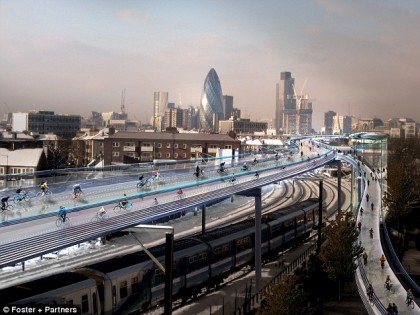
(Image by Foster + Partners)
Here are the bike-related links from around the world that caught our eyes this week:
Bike skyways: A British starchitect wants to build a 135-mile network of elevated bikeways above London’s commuter rail lines. (It’s an oddly familiar concept…)
Pollution exertion: “Cycling in cities could do more damage than good to a rider’s heart thanks to dangerous pollutants in the air, a new study has found.”
Affordable bike shopping: Bicycling magazine has a guide to shopping for a new bike for less than $1,000: “Manufacturers match each other closely on price and components, especially on lower-cost models, so mostly what sets bikes apart is fit and feel.”
Know thine enemy: Portland transit consultant Jarrett Walker rebuts a column that erroneously equates traffic congestion with long travel times by urging us to understand the writer’s behind-the-windshield perspective: “Many people’s brains are so fused with their cars that to them, congestion really is the same thing as urban mobility or urban liberty.”
Safety stats: Americans killed on bikes are four times likelier to be the victim of a hit-and-run than those killed in cars.
Bike sharing approaches: A Portland Tribune piece on the city’s imminent bike share deal includes numbers from Chicago’s system reminding that tourists are a very important revenue source for these systems.
Citi Bike prosperity: Six months after New York City’s bikeshare launched, retailers in a hurricane-hit neighborhood are lobbying for a station near them. “A Citi Bike station could bring more people, more New Yorkers, down here and hopefully help support the business,” a wine shop owner said.
Bike share ball drop: Killer product placement: six Citi Bikes will power this year’s Times Square ball drop on New Year’s Eve.
“Steel Grandpa”: Do you know the story of Gustaf Håkansson, the Swedish longbeard who won a 1,000 mile bike race in 1951 through a shocking feat of physical stamina? Because you probably should.
Gas tax alternative: “Assessing a half-cent fee per ton mile would cost a typical American car owner about $50 per year and would cover the highway fund’s revenue shortfall,” figures Michael Webber. “With a fee on the order of two cents per ton mile, gas and diesel taxes could be eliminated entirely.”
Maximizing happiness: What would a city look like if it set out to maximize “joy, health, freedom, resilience, equity, and social connections“? Writer Charles Montgomery shares some clever lessons from Bogota, Copenhagen, Freiberg, Davis and Vancouver.
Street transition: A few years after cars became common in one Mexican city, a group of activists is responding to the new, palpable sense of danger by campaigning for the country’s first 19 mph “slow zone” throughout downtown.
Standardizing bike signals: Green bike boxes and dedicated bike traffic signals are about to be endorsed by one of the bibles of the U.S. traffic engineering profession.
NYC victory lap: “Since 2001, there’s been a stunning 30% decline in annual traffic fatalities” in NYC, says outgoing transpo chief Janette Sadik-Khan, who claims that the “biggest transformation” is that New Yorkers now want “streets to serve a variety of roles, not only the movement of heavy traffic.”
Big ideas: What’s the best thing your city did in 2013? Urbanists from around the country sound off. Pittsburgh floated a giant rubber duck on its riverfront; Los Angeles expanded its open streets festival; Portland agreed to build two miles of sidewalks.
Selling rideable bikes: David Arditti explores the mysterious failure of U.K. bike shops to sell bikes that are ready for everyday riding. He likes the German solution (“Bikes over a certain weight must be sold with lights conforming to certain standards”) and the Dutch one (“The demand for utility “Continental-style” machines won’t increase until the government makes the infrastructure better.”)
Nice stuff: BikeRadar has compiled the best bike gear of the year, in three categories: road, mountain and both.
Injured stunt rider: A major bicycle distributor is helping fundraise for the recovery of Martyn Ashton, who starred in the “Bike Road Party 2” video we featured on the roundup this month and suffered “life changing” spinal injuries earlier this year.
Bike fun forever: Bikehub’s Carlton Reid caught this fun detail: in 1892, the motto of the Arlington Wheelmen was apparently “Wha! Who! Wha!!”
Inspiration: Let’s close the last roundup of the year with this photo from the Facebook feed of Second Life Bikes in Asbury Park, N.J.:
If you come across a noteworthy bicycle story, send it in via email, Tweet @bikeportland, or whatever else and we’ll consider adding it to next Monday’s roundup.



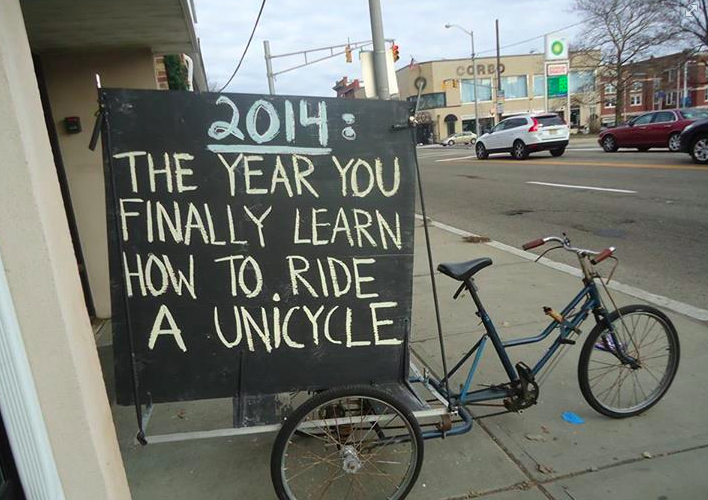
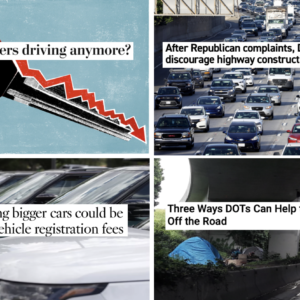
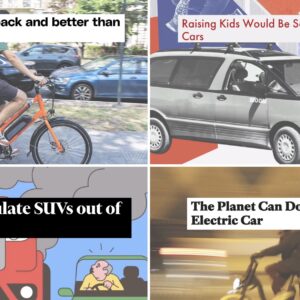
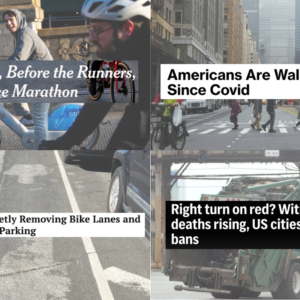
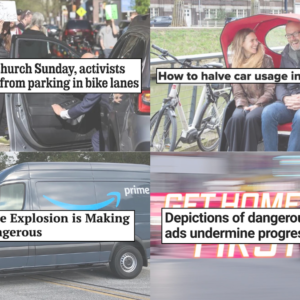
Thanks for reading.
BikePortland has served this community with independent community journalism since 2005. We rely on subscriptions from readers like you to survive. Your financial support is vital in keeping this valuable resource alive and well.
Please subscribe today to strengthen and expand our work.
“With a fee on the order of two cents per ton mile, gas and diesel taxes could be eliminated entirely.”
With a substantial boost in the gas tax we could eliminate all the foolish and complex workarounds we keep hearing about, and the time taken up debating them.
>> “Know thine enemy”
>> “Arch-enemy” (from previous MA column)
really ? sounds like a 14 y.o. comic book nerd .
Guilty as charged! Deal with it. 🙂
[snip] “Cycling in cities could do more damage than good to a rider’s heart thanks to dangerous pollutants in the air, a new study has found.”
I’m 62, and lived in London (east end, Bethnal Green area) last year. Rode approx. 8 miles per day through congested traffic, starting in September. Had a mild heart attack in March. I never had symptoms before–was always a “strong, fit” cyclist. In the hospital they didn’t quite know what to do with me–resting heart rate of 48, etc. Finally a doctor said–“your heart rate is low because you’re fit”. Right–fit with a heart attack. Wish I had acquired one of those masks–
I work on Swan Island. There are days I ride up the Going street hill and it’s just awful…you get blasted in the face with diesel fumes from trucks descending the hill. I really find myself questioning why I bother riding in at all. : (
Not worthy of moniker
diesel fumes really stink the air up. when will that fuel source go away!
Soon. Though not soon enough.
No, they will keep standardizing on things like ULSD that ruin engines under the guise of decreasing air pollution, just like ‘regular’ gas will continue to be made up of more and more ethanol under the same false promise. (Yes, we all know the best way to decrease pollution from cars is to drive less, accelerate conservatively, and keep everything maintained).
Recently I drove from Portland to San Jose and stopped to refill in Ashland as Oregon gas is more efficient than California gas, even in winter when they increase ethanol content there. On the east side of I-5 I came across a Valero selling ‘pure gas’ which was more expensive, but with half a tank of it managed to increase my avg nearly 5 MPG – even through the mountains. I didn’t even know it was legal, but later discovered pure-gas.org listing stations that sell it, FWIW.
From an energy news blog that slants towards petrochemical extraction Natural gas faces a long road to overtake diesel.
A refreshingly well balanced article out of the oil industry on the obstacles to CNG & LNG adoption in America’s transportation sector.
A CNG transportation fuel provider’s map of public stations. CNG has less energy density than diesel per unit volume so this limits truck range and requires more fueling stops.
A trucking industry blog article voicing sector concerns that CNG & LNG prices are too volitile and too complicated to fuel in to vehicles. The trucking industry is very conservative in regards to technology, energy costs, equipment costs and fueling infrastructure.
Liquefied NG is similar in energy density to diesel but requires much more expensive tanks that are stronger and cryogenically insulated.
Compressed NG doesn’t require the insulation but still needs a strong and expensive tank; it is less energy dense than diesel so more refueling stops are required.
Electric energy storage (batteries) are still chugging along in improvements but are no where near what truck freight reqires. Hopefully Tesla’s success will push real big VC funding in to battery R&D.
There are fringe expiriments with propane and Dimethyl Ether (DME synthetic liquid fuel: kinda in between diesel and gasoline, cleaner and more expensive than diesel, BMW is playing with it) but nothing scaled up enough to make a big difference.
For local in town trucking CNG will take over quickly: all your trucks come “home to roost” to the same yard every day alleviating fueling anxiety and further reducing costs if run the CNG equipment in house off of the local natural gas pipe.
For long haul trucking expect the industry to keep its head firmly buried in the sand until diesel prices double again.
Gas taxes and even the ton mile tax which is better than just straight per mileage taxing all ignore the fact that a 4 ton vehicle does 16 times the road damage per mile of a 2 ton vehicle, and 256 times the damage of a 1 ton vehicle. If the idea is to have the tax be somewhat inline with the cost you have to account for it and I have a feeling that the frieght lobby will make sure that doesn’t happen.
Also I don’t know about at the federal level but the state of Oregon can’t just look at the odometer to levy the tax, they aren’t allowed to tax miles driven outside the state, which is why they need some sort of GPS device to do it. I have a feeling the feds would have the same problem around not being able to do it this way because cars can be driven to mexico or canada.
I don’t know about elevated bike routes over railways, but if every mile of federally funded highway construction required bike/ped access and an easement for transit along the same corridor we’d be much farther along.
If that makes it prohibitively expensive or difficult to expand… oh well.
I’m sure there are plenty of obstacles to building elevated bike routes over railways, but one thought that came to mind is Elon Musk’s Hyperloop. Since it’s an enclosed structure there’s already a ‘roof’ on it that could more easily be adapted for this purpose. That, and it’s far enough off in the future that there’s hope that our culture will be more forward-thinking and not so car-centric by then.
Alas, what am I saying… we’re talking about it being in California. 🙁
I often wonder about the air pollution (mercury, etc) people inhale on the Springwater Corridor by the Ross Island cement operation. It smells and looks nasty, and cement pollution appears airborne with lots of water spray.
The big danger there would be rock dust. Silica dust is bad, and the rest of it isn’t much better. The water is there to keep the dust down.
The european and usanian city bikes i use weigh ~19 and ~21 lbs respectively when equipped with fenders, pedals, and lights. Riding the dutch city bikes favored by some “activists” would be the equivalent of carrying 4 sacks of flour in a backpack.
I ride one. It’s no big deal. It also puts the weight in the bike, not on your back 🙂
if it’s not a big deal then why are these bikes not selling?
Greg already bought his. 🙂
does anyone understand if driving with studded tires helps with gas mileage. seems wasteful to run these tires and huge trucks with only 1 person inside, the US seems to run on wasteful methods, reason i love to bike feel like i’m helping with it all.
Unicycling? Yes! Unfortunately, unicycle infrastructure in Portland is severely lacking (only one unicycle lane so far ===> http://www.bikehugger.com/images/blog/SANY0099.JPG) and there is no uni-equivalent of BikePortland.
You all might enjoy this photo of a man on a unicycle carrying home his Christmas tree. I took this last week on NE Morris, on the Klickitat Greenway.
https://twitter.com/msfour/status/414901254368657408/photo/1
http://www.sustainabletrans.com/Bikes-and-Bicycles-Littleton-CO.html in 1997…has always been something floating around in the back of my brain as a great way to connect commuter cities…
Williams Ave, 118 years ago: http://pdxtales.tumblr.com/post/71460313358/speed-demons-in-which-the-april-28th-1940
This is great! How’d you come across it? Can we repost tomorrow?
I just subscribe to the tumblr. Not my research.
Surprised you didn’t include the AP story that the O ran with (which quoted our good old friend Mr. Huckaby (and failed to fact check his incorrect rant)). Got quite a few comments (shocking, I know!)….
I saw Joe Rose comment that it wasn’t the O’s responsibility even though they ran it because it was an AP story, like that eliminates any responsibility the Oregonian has to fact check, even when their own previous articles repeatedly contradict the AP story. Total tabloid nonsense, but I am no longer surprised when I see this kind of thing in the Oregonian/Bikes vs Cars gazette.
Yes, their “transportation” pieces rarely qualify as news.
And then I get a kick when all the commentators complain about how liberal the O is. Apparently they must just be moderate as most liberals think they are conservative.
Pollution ?
We ASSUME that all new vehicles are in tiptop tune when delivered and so, they do not have to go through DEQ until their initial plates expire.
But reading test reports, many are not up to spec when delivered.
And those big diesel pickups that are all the style ? (especially the duelies) ..geeze those suckers belch big clouds of black smoke when they accelerate.
We need to get serious.
Let’s crunch some numbers and see how that 2 cents per ton mile looks for 2 cars: a gas hog Hummer, and a gas miser Civic. Assume each is driven 20,000 miles per year, all highway. The Hummer weighs 6,500 lb or 3.25 tons.
http://en.wikipedia.org/wiki/Hummer_H2
The Hummer gets 10 mpg, thus uses 2,000 gallons of fuel per year and does A LOT of damage to the highways due to the weight.
The Civic weighs 2,800 lb or 1.4 tons and gets 39 mpg using 513 gallons of fuel and does ALMOST NO damage to the highways.
http://automobiles.honda.com/civic-sedan/specifications.aspx
Proposed Tax on each vehicle:
Civic: TAX = 1.4 x 20,000 x $0.02 = $560
Hummer: TAX = 3.25 X 20,000 X $0.02 = $1,300
The Hummer only pays 2.3 times the tax that the Civic pays, yet it burns almost 1,500 gallons more than the Civic AND BEATS THE CRAP OUT OF THE HIGHWAYS. The Civic driver, choosing a more environmentally friendly vehicle in every respect, is subsidizing the Hummer driver. The Civic driver is being penalized – this is STUPID.
However, a tax applied on each gallon of fuel purchased would result in the Hummer driver paying 3.9 times the tax as the Civic driver. This is as it should be – the Hummer driver is doing great harm to the world with their idiotic vehicle – they SHOULD HAVE TO PAY OUT THE EFFIN NOSE!!!
If you hear ANYONE promoting ANY kind of mileage tax SHOUT THAT STUPID SONOVAPOOCH DOWN AT THE TOP OF YOUR LUNGS.
You’re on the right track with the per mile tax but state and federal Departments of Transportation have known that a linear tax scale isn’t enough.
From the Wikipedia page “Gross axle weight rating” 1st reference link ” ‘Equivalent Single Axle Load‘ @ Pavement Interactive” :
“Generalized Fourth Power Law The AASHTO load equivalency equation is quite cumbersome and certainly not easy to remember. Therefore, as a rule-of-thumb, the damage caused by a particular load is roughly related to the load by a power of four (for reasonably strong pavement surfaces). For example, given a flexible pavement with SN = 3.0 and pt = 2.5:
A 18,000 lb (80 kN) single axle, LEF =1.0
A 30,000 lb (133 kN) single axle, LEF = 7.9”
Taxing liquid fuel seems like a good idea only because we’ve been doing it for a long time. Tradition as a justification for doing something is how we’ve ended up with things like the Running of the Bulls. Some traditions are practical, some traditions are evidence that humans aren’t much smarter than squirrels; the trick is to dispassionately examine what we are doing, why and if it is actually effective.
With all the disparate energy sources hitting the mainstream (CNG, LNG, LPG, DME, biodiesel, ethanol, hydrogen, fuel cell electric, battery electric, inductive wireless electric) the government could save money on bureaucracy NOT operated by taxing the activity that is actually costing taxpayers money (road damage requiring repair) at a rate that road engineers know is required to finance continued maintenance.
Taxing fuel is a good idea because it hits those who “do the most damage” the hardest. A tax on miles driven is idiotic; my math above clearly demonstrates it penalizes light-weight, fuel-efficient vehicles. The ones who “do the most damage” to roads and the environment are those who drive the most and who drive the biggest rigs that get the worst mileage. That’s why the fuel tax is fair. If it isn’t high enough, raise it – it will not even be noticed – gas goes up and down $1.00 per gallon every year almost; people pay it without batting an eye. And a fuel tax levied at the pump already has all the bureaucracy needed for collection.
For electric vehicles, charge them an annual fee based on odometer reading or based on the weight of the vehicle. No GPS BS. The light-weight electric passenger cars probably do little damage to roads unless they have studded tires.
Studded tires should be charged a fee at time of purchase – whatever ODOT thinks is reasonable. I’d take a wild guess at $25 or $50 – if I need the studded tires, I’ll pay it – everyone knows they damage the roads.
Can’t recommend NG as passenger car fuel – might increase cost of fuel used to heat homes. Can’t recommend diesel or bio-diesel as fuel for passenger cars – it stinks, and diesel is needed to produce our food with farm machinery and to distribute all products in trucks/trains; if demand for diesel is too high it will affect price of food and all products. Ever been behind one of those small (about 20 passenger) Trimet bio-diesel buses? They are a SEVERE health hazard to the air. Using good farm land to grow bio-fuel is probably not wise.
“Using good farm land to grow bio-fuel is probably not wise.”
Snake eating its tail…Our demand for combustibles is catching up with our demand for–and interfering with our ability to produce–other (arguably more necessary) things like, say, food.
I certainly hope that on the days I am able to leave the car at home, my use of extra food calories to get around makes more efficient use of the energy and land area put into producing that food, as opposed to driving a bio-fueled car making use of the energy/land area put into producing/processing fuel crops.
“For electric vehicles, charge them an annual fee based on odometer reading or based on the weight of the vehicle. No GPS BS. The light-weight electric passenger cars probably do little damage to roads unless they have studded tires.”
@trek 3900 the state can not tax based on the odometer because they are not allowed to tax miles driven outside the state.
The problem is that newer fuel sources don’t have the bureaucratic infrastructure setup yet. Some fuel sources like wood gas and biodiesel are inherently intrusive to tax. Hydrogen combusted in an ICE will be less efficient than fuel cell electric powered. I can buy a CNG conversion kit for my Honda Accord and for about $1,500-$2,000 more I can get a natural gas compressor that allows me to fuel at home entirely of the grid of taxation.
The point is that there is a fundamental drive to spend less on everything. If there is a cheaper energy source or an untaxed energy source drivers will flock to it. By taxing an adjunct to the cause of the road damage we only ensure that we will be chasing this greased pig forever. Wise or intelligent has nothing to do with it, only the drive to spend less money.
If this works on electrics why not apply it equally to ALL VEHICLES? Damage to our public roads occur due to WEIGHT and MILES not FUEL(exception: leaky old engines over asphalt – hot petrochemicals weakens asphalt).
As for a weight-mile tax being “idiotic” you still seem to be thinking linearly. The government road engineers all use a “forth power law” approximation to estimate road wear caused by weights of vehicles of all types.
Not X*X, Not X^3, but X^4 or X*X*X*X. Unless you are actually a road engineer I suspect that their equations are more accurate than your common sense.
But studded tires need to be taxed prohibitively at point of sale; maybe even require a registration sticker on the vehicle that can be seen by police so they can fine studded tire users that haven’t paid the extra usage fee up front.
q`Tzal
“If this works on electrics why not apply it equally to ALL VEHICLES?”
My first post tells why not using math – a linear per-ton-mile tax penalizes fuel efficient vehicles; a linear mileage-only tax would HEAVILY penalize fuel efficient vehicles. Electric vehicles cause no damage to the highways -they are light-weight and there are very few of them – they are totally insignificant. The only reason the state wants to tax them at all is to make more money – some bureaucrat can’t stand the fact that 18 vehicles each day aren’t paying their fuel tax. If they just HAVE to collect $$ from those 18 vehicle owners, do it based on odometer reading when the license is renewed.
Some people NEED studded tires; do not “tax them prohibitively” – just tax them to cover the damage they cause.
For NG fuel, TAX THE FUEL, not the mileage. If there are any untaxed energy sources, then TAX them.
YOU are the one thinking linearly: you are proposing mileage taxes even though you keep telling us that heavy vehicles do the most damage by the fourth power law; and I do not doubt that. BUT no one in the original post, or any comment has proposed a tax based on the 4th power of vehicle weight. If you want to propose a tax based on mileage AND the 4th power of vehicle weight then I might go for that, BUT in no case would I go for a linear “per ton mile” tax.
All of the other fuel sources are not “hitting the mainstream”. They are equivalent to a fart in a hurricane.
Obviously you read “per ton mile tax” as a linear tax. I accept this mis-communication as mine. I agree 100% that a linear tax won’t effectively fund actual upkeep of roads. It HAS TO BE exponential. The engineers say this and I trust scientists and engineers.
Driving a big truck as I do I get to see daily how much the trucking industry is screwing the rest of us. Any place with concentrated heavy truck traffic is also a place with a road surface damaged to somewhere in between broken cobblestone and packed riprap/gravel dirt road.
My point being is:
A) we shouldn’t be giving Hummer drivers a free ride over Prius drivers
B) we shouldn’t be giving commercial trucks free ride over private automobile drivers
Now they freight industry can argue about the common law origin of public roads (roman military, ship construction and heavy commercial commerce) and how they might think they should have the final say. The simple fact of the matter is that ONE of the biggest externalities of Over-The-Road Truck Freight is that the cost of excessive road wear by heavy freight is passed on to every citizen who pays gas taxes, registration taxes and property taxes to allow these freight companies to keep their costs artificially low.
As for other fuels: I’ve been listening to too many economics (in particular the Freakanomics podcast) podcasts to think that other minor fuels shouldn’t be worried about. It is a simply a matter of price; as soon as something else is cheaper people will switch to it, the more drastic the difference the more sudden and vast the change. My contention is that on the long term relying on a type-of-energy-source model leaves our collective tax coffers susceptible to the vagaries of economic fluctuation.
Nice civil chat though, thanks.
We could argue forever on studded tires. I won’t buy them for my car until someone comes out with an affordable version of the auto retracting studded tires that asks the car computer if it is cold enough and then only does it if there is traction slip issues.
In all my reading of DOT research papers and studies the studded tire wear on dry roads is the only wear factor that disproportionately comes close to heavy trucks.
Nice civil chat though, thanks.